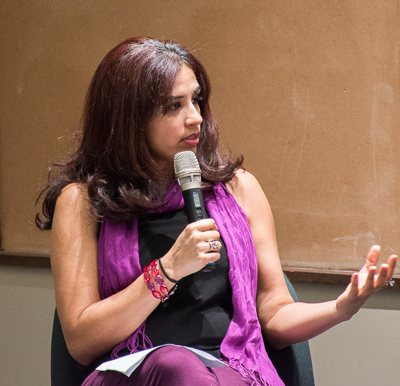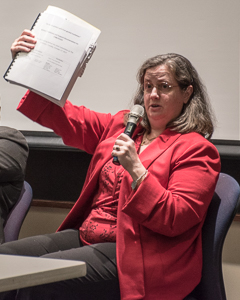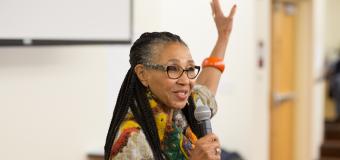Practitioners of female genital mutilation (FGM) offer three reasons why they cut young girls: it’s a religious observance, it curbs sexual desire and it makes sex more pleasurable for men.
Anti-FGM advocates say those reasons are untrue, and add that states need to adopt laws to protect the half-million women in the United States who are at risk of being compelled to undergo the procedure.
As part of Lesley’s Violence Against Women initiative, we hosted a screening of the documentary “A Pinch of Skin,” about the practice in India’s Bohra community, followed by a panel discussion on FGM.
Lesley graduate and FGM survivor Mariya Taher, obstetrician and gynecologist Dr. Melody Eckardt, Abdirahman Yusuf of the Somali Development Center, and attorney Joanne Golden comprised the panel, calling for an end to FGM in Massachusetts through education and legislation.
“We’re learning that it happens in more communities than we realized,” said Taher, who co-founded Sahiyo, an organization that advocates for an end to FGM. (Read more about Taher here.)
Taher, who grew up in a Bohra community in the United States, underwent FGM or female genital cutting (FGC) during a family trip to India when she was 7. She later came to question the practice and, eventually, to speak against it publicly.
Many consider the procedure, which involves cutting or removing the clitoris, a mere nick, a “pinch of skin.” The negative effects are much more severe, said Eckardt. In this article we will look at three interconnected areas where the panelists are working to end FGM and help those already victimized: the medical profession, culture and religion, and legislation.
Medical complications
As the former director of Women’s Refugee Health at Boston Medical Center, Eckardt has worked with women from African communities that practice FGM and has performed corrective surgery. The Bohra community practices Type I FGM, defined by the World Health Organization as “partial or total removal of the clitoris and/or the prepuce,” while many of Eckardt’s patients have experienced the more severe Type III. Those patients have had their vagina sewn closed, leaving a small opening.
“There’s a whole lifetime source of problems that can arise from it,” said Eckardt, who is now the senior adviser for maternal health projects at Massachusetts General Hospital.
These women experience extreme pain when they begin menstruating, have sex and give birth. They have scar tissue and often cysts, prolonged labor, postpartum hemorrhaging and higher infant mortality rates, Eckardt said.
Yet as a resident, she didn’t hear about FGM. Thankfully, she said the medical community is becoming more educated on the topic. That is crucial so they know how to respectfully care for and treat these women.
Culture and religion
Yusuf, whose mother and sisters underwent Type III FGM in Somalia, said there is a lot of misinformation in practicing communities. For example, one girl was told that without the procedure she wouldn’t be able to sleep at night without having sex.
In “A Pinch of Skin,” one woman explains how the procedure keeps girls from promiscuity, removing the “immoral lump of flesh.”
For Yusuf’s own family, now living in North America, those ideas have slowly begun to change. As some younger women have grown up without the procedure, the elder women have been surprised to find that what they’ve been told about sexuality is not true, and the young women do not become “sex fiends,” said Yusuf.
He and others on the panel also emphasized that religious texts don’t command or even mention cutting — not the Qur’an, the Torah or the New Testament — yet religion is often a reason used to support the practice by believers who don’t know otherwise.
Practitioners of FGM do not believe they are harming women, either, said the panelists. In fact, women are often the ones who perform it, and men don’t always know FGM exists. The panelists said it is important to recognize that this is multi-generational violence against women but it should not become a reason to stigmatize or persecute these communities. That is why “education is absolutely, absolutely essential,” Yusuf said.
Legislation
Education and community outreach are the foundation of the Massachusetts bill to outlaw FGM. Golden, Eckardt and Taher have worked on the bill, which was brought before the state Judiciary Committee in 2013 and 2017. The most recent version is under review and emphasizes collaboration with nonprofits and other agencies that are already engaged in FGM-related prevention, so as to maximize resources and effectiveness.
Although a federal law banning the practice was passed in 1996, legislation at the state level makes it easier for law enforcement to prosecute. The first FGM trial, taking place in Michigan, has brought the issue to the national news and demonstrates why more laws are needed. The case involves a doctor and member of the Bohra community who performed an estimated 100 procedures on adolescent girls. It wasn’t until girls were taken across state lines, from Minnesota to Michigan, that the federal government stepped in.
Michigan has since approved laws to protect girls, and the panelists want to see Massachusetts follow suit.
Even so, there are protections in place, said Golden.
“It’s already child abuse in Massachusetts.… Reckless endangerment laws already exist, assault and battery laws already exist,” said Golden, and mandated reporters are required to alert authorities.
Ultimately, the panelists say there is no reason to support FGM, and only reasons to end the multigenerational violence against women.
“Why it’s being done is to inhibit what’s natural,” Golden said. “Your body is the way it is for a purpose.”




